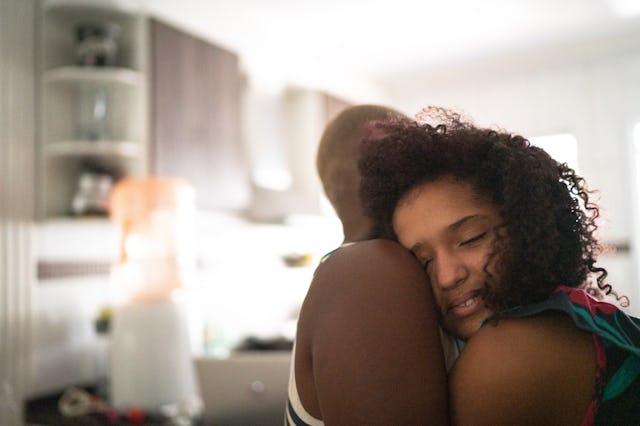In Our House, We Talk About Mental Health Every Single Day
There is no shame in being vulnerable.

It’s really hard to admit that I’m not a supermom. It’s much easier to pretend that mom has it together all the time. But truthfully, I don’t — not even a little bit, not even sometimes. But do you know what would be even harder? Watching my kids struggle with their mental health because we didn’t have open and honest conversations about it.
It’s taken a few years, but I’ve finally learned to manage my high-functioning anxiety, CPTSD, and depression. Acknowledging it was half the battle; the other half is being vulnerable enough to be honest about how hard it is to ask for help — and, for me, that part never ends. Not only because it’s a critical part of my healing. I also do it because I hope that having these conversations every single day ends the stigma for my littles. The goal is to talk about mental health like we do our physical health, because after all, mental health is health.
How to Incorporate Mental Health Conversations Everyday
“Mom, do you have a headache every single day?” my daughter asked once before bed, watching me take one of my prescriptions.
“No, baby. Why do you ask?” I replied. “Because I always see you taking medicine,” came the answer.
This was my catalyst to make these conversations part of our regularly scheduled program. When I was growing up, we didn’t talk about it. Not by any fault of my parents — nobody else around us did, either. Instead, we grew up hearing: Grin and bear it. Don’t air your dirty laundry. You worry too much.
I didn’t even know my dad was treating his own anxiety and depression with medication until I was in my 20s. I suppose that, in a way, it really wasn’t my business. But knowing that would have influenced my own actions, and I probably wouldn’t have suffered silently for years thinking I was just too weak, too emotional.
So now, I choose to be proactive instead of reactive. My kids know I go to therapy, and they know I take medicine so I can be the best mom I can for them. We have open conversations about our mental health and our feelings, whether they’re good or bad.
And even though my kiddos are young, it’s not too soon for them to recognize when they have hard feelings. There is so much power in being able to sit with those emotions, acknowledge them, and then move forward. They already understand that sometimes, it’s not something you can do on your own. My oldest child, who is 10, came to me at one point and asked if she could go to therapy. When I asked why, the response made me the proudest mom around: “My heart just feels sad. You always seem calmer after therapy, and I want to feel that way too.” It took me 30-something years to be that self-aware. To know my daughter feels safe enough to be vulnerable about the hard feelings she has makes me feel like I must have done something right.
There is No Shame in Being Vulnerable
I’m proud to talk to my kids about the reality so many people live with every single day. My feelings about being one of those who struggle are more complex: I’m not ashamed, but it still sometimes makes me feel like a failure as a parent. I want to be strong. I want to be more resilient. I want to be normal.
But I’m not a failure. I am strong — tackling conversations head-on, no matter how hard, shows strength. And yes, I am resilient. Even though I’ve lived through trauma, I’ve bounced back. Well, maybe “bouncing” is a stretch, but my struggles didn’t define me.
Accepting that my mental health conditions don’t make me less than or a bad mom is one of the great victories of my life so far. But my greatest accomplishment is breaking the cycle of stigma when it comes to my kid’s mental health concerns. The kids know they can talk to me about how they’re feeling without judgment. And that’s the first step to treating mental health the same way we treat our physical health.
Don’t get me wrong, I’m not always excited to talk with my kids about why I take medication or why I go to therapy. But I can honestly say I never regretted it. Not for a moment.